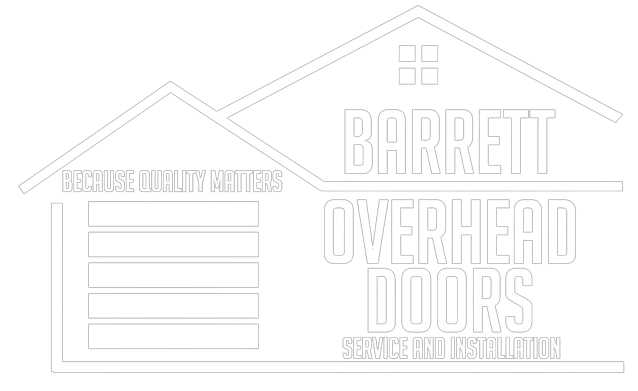FAQs
Barrett Overhead Doors
Have a garage door-related question? Barrett Overhead Doors has the answer. Check out these FAQs and give us a call today for more information!
-
Why won’t my garage door close or open?
If your garage door won’t open or close, the problem may be due to broken garage door springs, a misaligned safety sensor, a disconnected garage door opener, or an issue with the remote control or wall switch. Power outages, dead batteries, or something blocking the sensor beam are common culprits. Sometimes, garage door tracks can be bent or the rollers off track. We can check these components to help identify the issue. Regular garage door maintenance can prevent most of these problems and ensure smooth operation. Call us today to schedule a maintenance program.
-
How long do garage door springs last?
Garage door springs typically last between 7 to 10 years or 10,000 cycles, depending on usage. One cycle equals the garage door opening and closing once. If you use your garage door multiple times a day, the springs may wear out sooner. There are two main types: torsion springs and extension springs, and both have limited lifespans. Replacing garage door springs is a job best left to professionals, as improper installation can be dangerous.
-
How often should I service my garage door?
You should service your garage door at least once a year to ensure safety and longevity. We will inspect components like garage door springs, cables, rollers, and openers to detect wear and prevent costly breakdowns. Regular garage door maintenance includes lubricating moving parts, tightening loose hardware, and testing the balance and auto-reverse feature. A well-maintained garage door is less likely to fail and will extend the life of your garage door opener and door system.
-
What is the R-value of a garage door?
The R-value of a garage door refers to its thermal resistance, which measures how well it insulates. A higher R-value means better garage door insulation, which helps regulate temperature and improve energy efficiency—especially important for attached garages or those used as workspaces. Standard non-insulated doors have an R-value of 0–3, while insulated garage doors can reach R-values of 12 to 18 or more.
-
How long should a garage door opener last?
A typical garage door opener lasts around 10 to 15 years, depending on its quality and usage frequency. Chain drive, belt drive, and screw drive openers all have different lifespans. Performing regular maintenance and using the door responsibly (avoiding excessive opening/closing) can extend its life. If your opener is slow, noisy, or lacks modern features like Wi-Fi connectivity, it might be time to upgrade.
-
What colors can garage doors come in?
Garage doors come in a wide variety of colors, including white, black, gray, brown, beige, red, green, blue, and even custom paint finishes. Manufacturers offer standard colors or allow garage door color customization to match your home’s exterior. Choosing the right color can boost curb appeal and complement the architectural style of your home.
-
Can my non-insulated garage door be insulated?
Yes, we can insulate a non-insulated garage door. This upgrade helps reduce energy costs, control garage temperature, and block outside noise.
-
I lost my garage door remotes. Can I get new ones to replace them?
If you’ve lost your garage door remote, you can easily replace it. Check your garage door opener brand and model number, and call us today for a replacement garage door remote.
-
If I hit a section of my garage door, do I have to replace the whole door?
If only one garage door panel is damaged, you might not need to replace the entire door. In many cases, you can replace a single garage door section if the rest of the door is still structurally sound. This is often much more cost-effective than replacing the whole unit. Contact us to find out if this is an option for your specific garage door model.
-
How do I tell if my garage door spring is perfectly balanced?
To check if your garage door spring is balanced, disconnect the opener by pulling the emergency release cord and manually lift the door halfway. If it stays in place without rising or falling, the spring is properly balanced. If it slams shut or shoots up, the spring tension is off and may need adjustment. A garage door out of balance can strain your opener and be a safety hazard.



Share On: